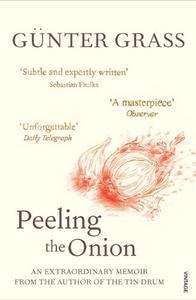Peeling the Onion

Editorial Vintage UK
Fecha de edición junio 2008
Idioma inglés
EAN 9780099507598
480 páginas
Libro
encuadernado en tapa blanda
Resumen del libro
Peeling the Onion is a searingly honest memoir that evokes Grass' modest upbringing in Danzig, his time as a boy soldier fighting the Russians and concludes with the writing of his masterpiece, The Tin Drum, in Paris.
Grass' parents ran a corner shop, but his mother, whom he adored, encouraged him towards books and music. Like most of his peers, he joined the Hitler Youth and in 1944, when he was just 17, he was sent to the Eastern front with the Waffen SS and found himself facing Russian tanks and machine guns. Recovering from shrapnel wounds in a military hospital, he had the good fortune to be taken prisoner by the Americans.
In the aftermath of the war, following a stint as a miner, Grass survived by trading on the black market and resolved to become an artist, eventually enrolling at the Academy of Arts in Düsseldorf. While living as an artist in Berlin with his first wife Anna, a ballet dancer, he started to concentrate on writing poetry. It was after the couple moved to Paris that the first sentence of the novel he had been determined to write and that would make his reputation came to him: Granted: I am an inmate of a mental hospital'.
Biografía del autor
x{0026}lt;P x{0026}lt;B Günter Grassx{0026}lt;/B (Danzig, 1927-Lübeck, 2015) se hizo escritor después de haber recibido una sólida formación como escultor y dibujante. Su obra comprende poemas, dramas y, sobre todo, novelas.x{0026}lt;/P x{0026}lt;P x{0026}lt;I El tambor de hojalatax{0026}lt;/I (Alfaguara, 2009), una de las cumbres de la literatura europea contemporánea, compone junto con x{0026}lt;I Años de perrox{0026}lt;/I (Alfaguara, 2013) y x{0026}lt;I El gato y el ratónx{0026}lt;/I (Alfaguara, 1999) la célebre Trilogía de Danzig . Su fama se ha cimentado sobre estas y otras obras maestras como x{0026}lt;I El rodaballox{0026}lt;/I (Alfaguara, 1999), x{0026}lt;I Es cuento largox{0026}lt;/I (Alfaguara, 1997) o x{0026}lt;I A paso de cangrejox{0026}lt;/I (Alfaguara, 2003).x{0026}lt;/P x{0026}lt;P Testigo de su época en permanente lucha contra el silenciamiento del pasado, entre su producción de carácter ensayístico y autobiográfico destacan x{0026}lt;I Mi siglox{0026}lt;/I (Alfaguara, 1999), una recopilación de sus reflexiones sobre cada uno de los años del siglo XX, x{0026}lt;I Del diario de un caracolx{0026}lt;/I (Alfaguara, 2001), x{0026}lt;I Cinco deceniosx{0026}lt;/I (Alfaguara, 2003), su controvertida obra autobiográfica x{0026}lt;I Pelando la cebollax{0026}lt;/I (Alfaguara, 2007), x{0026}lt;I La caja de los deseosx{0026}lt;/I (Alfaguara, 2009) y x{0026}lt;I De Alemania a Alemania. Diario, 1990x{0026}lt;/I (Alfaguara, 2011). En 1999 recibió el Premio Nobel de Literatura y el Premio Príncipe de Asturias de las Letras.x{0026}lt;/P








